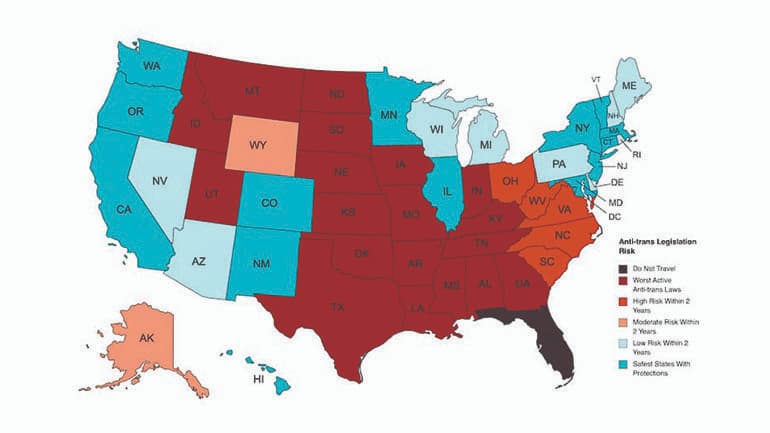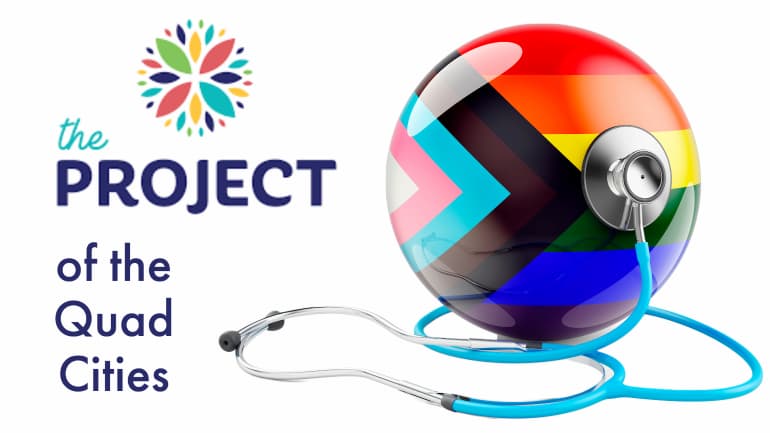MOLINE – Aiming to fill the gap of care left by Iowa’s new ban on gender-affirming care for minors, The Project of the Quad Cities plans to start serving transgender youth with puberty blockers and hormone treatments by September.
The nonprofit kicked off a fundraising campaign this week to raise $100,000 for the new initiative. TPQC began providing gender-affirming care for adults in April.
The campaign and pending services for youth come at a time when 19 states, including Iowa, have banned puberty blockers, hormone treatments or gender-affirming surgery for people under the age of 18.

This map, generated by blogger Erin Reed of Erin in the Morning, shows the states that ban gender affirming care for minors. States in red have banned gender affirming care for minors.
“Gender-affirming care has been highly politicized to the point that public policy is now harming our most vulnerable populations,” said Caitlin Wells, executive director of The Project, in a press release. “We can be a part of the solution. The Project is uniquely positioned to provide this type of care because of our experience serving the LGBTQ+ community and our geographical location along the Mississippi River in Illinois.”
Clients anticipated from Iowa and waiting lists at clinics in Minneapolis, Chicago
The Project doesn’t yet know how many under-18 potential patients exist throughout the region that are seeking gender-affirming care, said Andy Rowe, TPQC’s director of health care operations. But with the Quad Cities just over an hour from Iowa City, home to the nationally-known University of Iowa LGBTQ+ Clinic, an influx of clients is anticipated from there once Iowa’s ban on gender-affirming care for youth takes effect in September.
Rowe says Iowa City’s clinic is currently serving about 250 people with gender-affirming care, an unknown number of which are under the age of 18. UnityPoint Health in Waterloo reported 28 under-18 patients from throughout Iowa who received puberty blockers in 2022, reports The Gazette in Cedar Rapids. Planned Parenthood in Iowa also provides hormone therapy treatment for transgender people.
Overall, about 2,100 Iowans age 13 to 17 identify as transgender, says the UCLA Williams Institute. Illinois has about 13,700 transgender youth. Throughout all 12 Midwestern states, more than 54,000 teens identify as transgender, according to the study.
Nationwide, more than 144,000 transgender youth live in states that have banned or restricted under-18 access to gender-affirming care, says the Williams Institute.
Those youth seeking puberty blockers or hormone treatment – both of which halt the body’s natural emergence of qualities associated with gender at birth – will have no options for care in Iowa after September. Waiting lists already exist for gender-affirming clinics in Minneapolis and Chicago, Rowe said.
“There’s not enough services today,” he said. “That’s only going to get worse.”
Funding will help with equipment, insurance, legal needs, wrap-around services
Already, since starting gender-affirming care for adults in April, The Project is seeing patients switch over from Waterloo, Iowa City, Peoria and “a whole variety of places,” Rowe said.
But the move to expand that care to youth brings additional challenges and needs that require additional funding, he said. Those include additional equipment and malpractice insurance for the providers with whom TPQC will partner to provide the new services.
The funding will also help prepare TPQC for legal challenges that are anticipated to the program. Care providers who are licensed in both Illinois and Iowa, and who collaborate with TPQC on gender-affirming care for minors, may face efforts to remove their licenses to practice in Iowa, Rowe said.

Caitlin Wells, CEO of The Project of the Quad Cities, and Andy Rowe, director of health care operations.
“We still don’t know for sure what’s going to happen.”
The Project wants to be ready for the legal challenges. In addition, TPQC will be bolstering its provision of “wrap-around services” to support their gender-affirming care, Rowe said. Those services include case management, counseling, and general health care.
“We want to make sure we have the full wrap-around services to give folks, and the certainty that we’ll be able to do that over the longer term,” Rowe says. “We don’t want everyone to switch over and in six months, we’re out of money.”
The Project has created an information page about its new initiative to provide gender-affirming care for youth. Find a link to donate, a map showing the status of gender-affirming care in all 50 states, and more information at tpqc.org/gac-for-youth.
The nonprofit has been providing testing and treatment for sexually transmitted infections, and mental health care, for marginalized communities for decades. It serves 20 counties along the Iowa/Illinois border and also offers general health care for LGBTQ+ people, harm reduction services, support groups and counseling.


